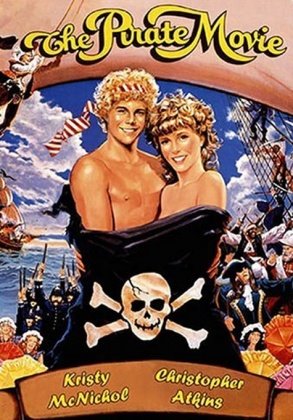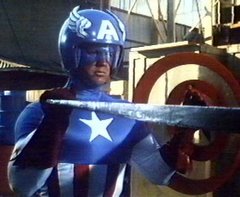
Is it just me, or does everything sound just a bit more “Western-ish” with the suffix “-rado?”
“Desperado,” “Silverado,””El Dorado” It's like adding “-capades” after something and automatically thinking of ice skating.
Adding “-rado” somewhere in “3:10 to Yuma” may have helped the title, which does not exactly roll off the tongue, but the film certainly needs no help elsewhere, as director James Mangold's solid, scruffy take on the wild west is a throwback in the best possible ways.
Based on an Elmore Leonard's tale (and it's 1957 film), “Yuma” is steeped in all the spur-janglin', gun-totin', spittoon-dingin' elements that made this type of film into a genre all its own.
“Desperado,” “Silverado,””El Dorado” It's like adding “-capades” after something and automatically thinking of ice skating.
Adding “-rado” somewhere in “3:10 to Yuma” may have helped the title, which does not exactly roll off the tongue, but the film certainly needs no help elsewhere, as director James Mangold's solid, scruffy take on the wild west is a throwback in the best possible ways.
Based on an Elmore Leonard's tale (and it's 1957 film), “Yuma” is steeped in all the spur-janglin', gun-totin', spittoon-dingin' elements that made this type of film into a genre all its own.
“Yuma” pits rancher Dan Evans (played by Christian Bale) against outlaw Ben Wade (played by Russel Crowe). Evans is struggling to save his property from encroaching railroad magnates and to save his dignity for his wife and two young sons.
Hobbled by battle in the Civil War and shepherding cattle on a dry dirt patch, Evans is both broke and broken.
When Wade's posse gallops into town for a local stagecoach heist, Wade is nabbed by the local law. The desperate and destitute Evans volunteers to escort the wily outlaw to a nearby town to be shipped out and face trial.
Hobbled by battle in the Civil War and shepherding cattle on a dry dirt patch, Evans is both broke and broken.
When Wade's posse gallops into town for a local stagecoach heist, Wade is nabbed by the local law. The desperate and destitute Evans volunteers to escort the wily outlaw to a nearby town to be shipped out and face trial.
Evans sees the journey as a chance to make enough to save his farm and what little pride he has left because he's “tired of the way his boys look at him and tired of the way his wife won't.”
Wade gamely eggs Evans on, for he first sees him as just another body for target practice when his cronies come to rescue him.
Wade gamely eggs Evans on, for he first sees him as just another body for target practice when his cronies come to rescue him.
But it's soon obvious that Wade takes a shine to this tattered-but-determined rancher. He sees in him the same resolve and steely drive that he possesses, and perhaps sees the man he could have been if he were on the right side of the law.
This is not to say that Wade is a softy by any means. He's quick to show men the losing side of his pistol and doesn't much care for excuses.
This is not to say that Wade is a softy by any means. He's quick to show men the losing side of his pistol and doesn't much care for excuses.
Director Mangold could not have found a better man to fill Wade's Tony Lamas (it's a popular cowboy boot brand, look it up). Crowe seems genetically engineered for such films – from his charcoal-burnt vocals to his swaggering tree-trunk physique. And his playful, deadly glint makes him equally hard to resist and harder to read.
And as Bale have proven in past roles (most notably his ghostly turn in “The Machinist”), he is capable of holding what seems like decades of pain in his hollow cheeks. His Evans is a pitiful man, but not once do you pity him, as he balances on the edge of a breaking point.
The casting of the two actors is essential to “Yuma,” as it is more about their psychological showdown than their ability to unholster their firearms. There are moments of Winchester-pumped action that puncture the film, but Mangold seems more interested in watching the two men watch one another – each taunting, circling and even admiring the other.
The supporting cast is as strong as its unbridled landscape, too. Gretchen Mol makes a welcome return, albeit a brief one, as Evans' long-suffering wife, and Peter Fonda, worn and leathery as a floor-length duster, does his best John Wayne impersonation as an old antagonist of Wade's.

But it is Ben Foster who reigns in the film's biggest surprise in a crucial role as Wade's vicious right-had gun Charlie Prince. In past roles, Foster has either underplayed his part (the Angel is “X-Men 3”) or acted like he forgot his daily dose of Ridalin (“Alpha Dog”). But his barnstorming performance here demonstrates he's destined for bigger things. As Charlie, he watches over his captured boss like a coyote watches over a flock of wayward sheep, and we sit one edge waiting for him to move in for the kill.
The death knell for the western genre has been sounding for years, but every so often a film rolls into theaters like a stray tumbleweed to remind us that as it may be long past the high noon of its popularity, the heart of the traditional style still beats loudly (2003's dream-like “Open Range” and 2005's gritty “The Proposition” are recent examples that come to mind).
“3:10 to Yuma” may not be remembered as a classic of the genre (the conclusion drags on a little too long and is filled with the cliches of gangs of gunmen who, when it comes down to it, can't seem to hit their target if it slapped them in the face), but it certainly is enough to jumpstart the interest of those who have grown up thinking that westerns are typified by self-important pomp like “Dances with Wolves” caricature-laden oaters like “Tombstone” or parodic romps like “Shanghai Noon,” and get them to search the shelves of the video store for when the West was (number) one.





No comments:
Post a Comment